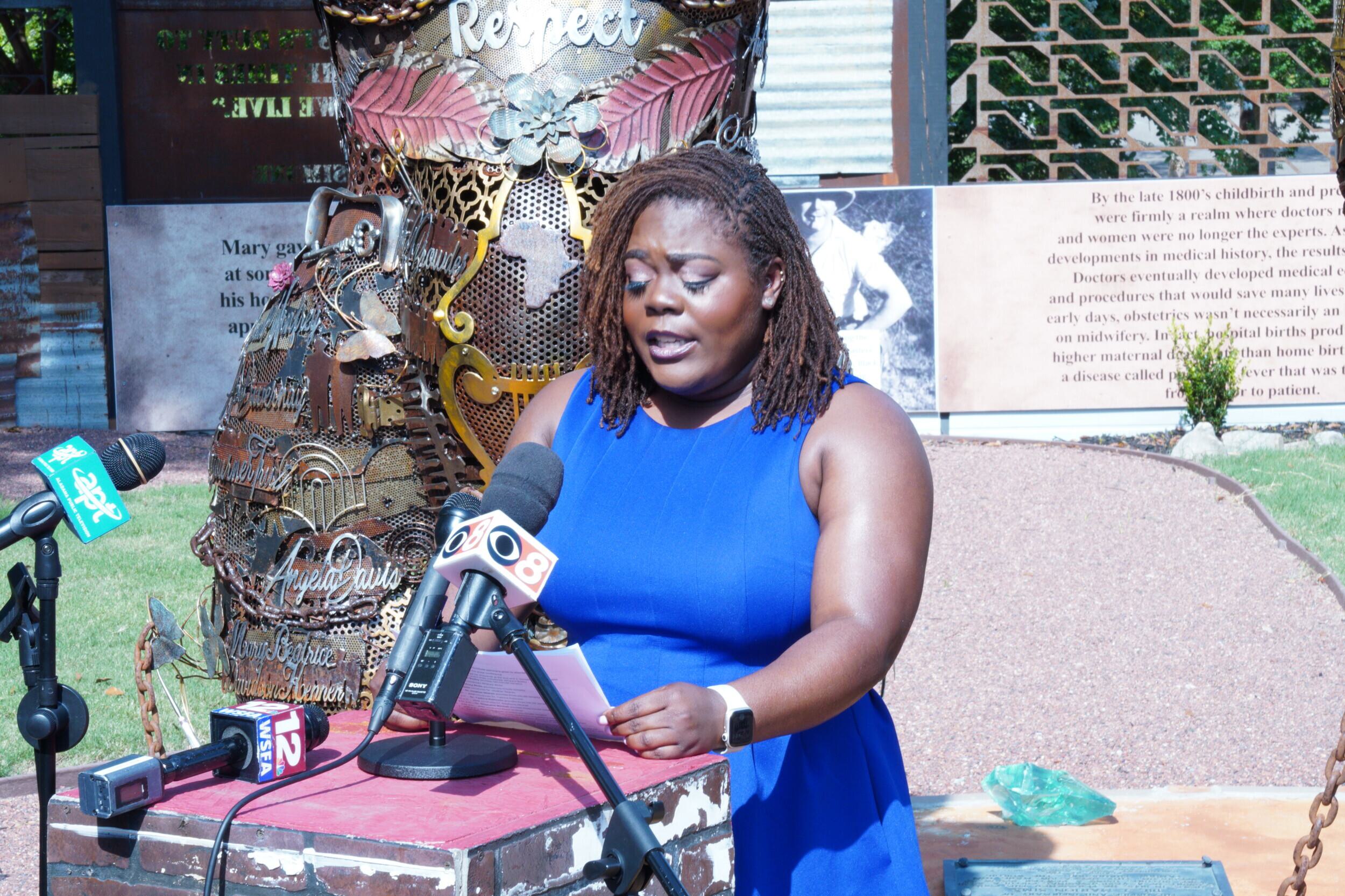MONTGOMERY — The American Civil Liberties Union (ACLU) of Alabama filed a lawsuit on behalf of several doctors and midwives against the Alabama Department of Public Health (ADPH) to combat proposed rules by ADPH to regulate birth centers in Alabama.
For over a year, birthing rights advocates have opposed ADPH's proposed regulations, saying they would constitute a de facto ban on the existence of all birthing centers in the state.
Opponents of the rules offer varying critiques, ranging from lack of accessible birthing care in rural areas, restrictions on those who do not want to labor in a hospital but cannot access a home birth, unrealistic and cost-prohibitive measures placed on birthing centers, and more.
SEE ALSO: Advocates speak out against proposed ADPH regulations for birthing centers
At a Tuesday press conference at the Mothers of Gynecology Park in Montgomery, representatives from the ACLU and several birthing center owners and midwives announced the lawsuit.
Alabama previously had regulations for birthing centers, which it repealed in 2010 due to the lack of centers in the state.
Opponents said ADPH is proposing to essentially reinstate the previous rules that existed before midwives were permitted to deliver babies in Alabama, evidenced by the rules' antiquated language and terminology. Among other things, the proposed rules would require birthing centers to receive hospital licenses, which have yet to be issued to any birth centers in the state.
The lawsuit filed Tuesday brings several statutory and constitutional claims against ADPH, including:
ADPH lacks the authority to require birth centers to obtain a hospital license because midwife-led birth centers do not constitute "hospitals" under Alabama law.
Even if ADPH has licensing authority, it does not have the authority to ban birth centers altogether, and by failing to provide any path to licensure, the Department is imposing a de facto birth center ban throughout Alabama.
"The state of Alabama is making it difficult if not impossible for birth centers to survive," said JaTaune Bosby, executive director of the ACLU of Alabama. "It has stood idly by as hospitals have closed and obstetrics services have become obsolete in many areas of the state. They have looked the other way as patients have had to travel long distances, across county and even state lines, to receive basic health services simply because they live in an area where adequate care does not exist. Obstacles and barriers erected by state lawmakers and agencies prevent individuals, like our clients, from helping their patients. More birthing centers are needed here. Midwives and doulas are needed here. Their services provide hope and will save countless lives."
Several birth center owners attended the press conference. Dr. Heather Skanes spoke to 1819 News in July. According to Skanes, ADPH forced her birthing center to halt accepting new patients it ironed out the regulations.
"I founded the Oasis Family Birthing Center in response to Alabama's maternal and infant health crisis, driven by a commitment to provide patient-centered, safe, and affordable care," Skanes said. "Amid a dire need for accessible prenatal care and personalized birthing options, we created a haven where midwives offer exceptional care in a home-like environment. Unfortunately, Alabama's Department of Public Health abruptly halted our services without regard to the high-quality care we were providing. Despite our pleas and willingness to demonstrate safety and value, they ignored us and left us no choice but to close. This lawsuit isn't just about our center; it's about equitable care for all. I hope the court will correct this injustice and begin to rectify Alabama's history of harm to Black mothers and infants by supporting a proven approach that enhances outcomes and accessibility."
Attendees of the press conference said they had not received a response from ADPH regarding the lawsuit.
Many women nationwide have been switching to alternative methods of birthing children other than in the hospital, often choosing to have a midwife, doula or both attend their birth.
RELATED: Alabama advocates continue struggle for birthing rights
The reasons for choosing midwifery care over hospital care are many. Some have had previous negative experiences with hospital birth. Others prefer a less medical approach to what they consider a natural bodily function that requires no medical intervention outside of emergencies.
Birthing centers offer a middle ground between a hospital birth and a home birth. According to one speaker, birth centers allow a "home-like environment" for mothers to give birth while still having access to certain medicines and interventions in the case of an emergency. Otherwise, the mothers can give birth as they see fit, in line with their preferences.
While there are various levels of certification for different kinds of midwives, they all require extensive training, and licensed midwives have stringent regulations dictated by the state.
Alabama has only allowed certified professional midwives (CPM) to perform births for five years, although they are still excluded from participating in hospital births.
Among other things, the proposed rules would exclude CPMs from delivering babies in birthing centers, which is not the practice for other birthing centers nationwide.
To connect with the author of this story or to comment, email craig.monger@1819news.com.
Don't miss out! Subscribe to our newsletter and get our top stories every weekday morning.










